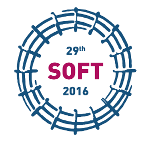Speaker
Yuanjie Li
(USTC)
Description
Thermal transport efficiency of a tritium breeding pebble bed can strongly affect tritium self-sufficiency of the magnetic confinement fusion solid breeding blanket system. The effective thermal conductivity of the pebble bed is related not only to its configuration, such as dimensions, pebble size, and pebble material porosity, but also to its environment, such as helium temperature, flow velocity, and purge throughput. currently under development, can analyze the thermal mechanical properties of individual pebbles of a pebble system, accounting for the effects of pebble fracture. Combining Computational Fluid Dynamics (CFD) with DEM enables analysis of the complex interactions between the solid and gaseous phases. This proposal aims to carry out numerical simulation of a bed of porous tritium-breeding lithium silicate pebbles, using the above-mentioned physics and mathematical models. The consequences of pebble fracture on the effective thermal conductivity of the pebble bed will be emphasized in the assessment, accounting for the multiple factors mentioned above. Through comparison with experimental data, understand the thermal transport mechanisms of the pebble bed, and clarify its thermal mechanical performance under multiple simultaneous influences. The results of the proposed work will strengthen the foundation of design for the magnetic confinement fusion solid breeding blanket system.
Co-authors
Jia Li
(USTC, hefei, China)
Pinghui Zhao
(USTC, hefei, China)
Wanli Yang
(USTC, hefei, China)
Yuanjie Li
(USTC, hefei, China)

